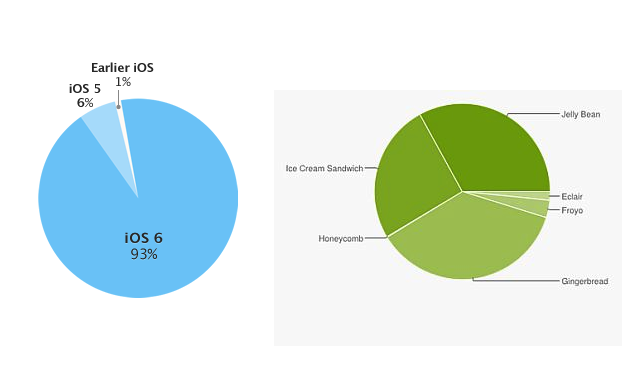Why app developers love iOS, not Android

Apple, perhaps for the first time other than the data it shares during events, has officially disclosed 'fragmentation' data for iOS devices.
According to the data available on the Apple website, 93 percent of iOS devices run iOS 6, the latest version of Apple's operating system. Just 6 percent of devices run iOS 5 and only 1 percent devices run iOS 4 or earlier. Apparently, this includes all iOS devices i.e. iPhones, iPod touch devices as well as iPads.
The graph that Apple has shared is very similar (in principal, if not the trends) to what Google shares every month for Android. It will be interesting to see if Apple updates this data every month, like Google does, or if this remains a one-off.
According to data shared by Google last month, only 4 percent of Android devices run the latest version, Android 4.2. If you expand the criteria to include all Jelly Bean (Android 4.1 and Android 4.2) devices, even then the number touches just 33 percent, a heaven and earth comparison when you stack it up against iOS.
![]()
Google's data is for all Android devices as well, mobiles and tablets. Interestingly, Apple's data is based on devices connecting to Apple's App Store during a 14-day period ending June 3, 2013. This is the same cut-off date and criteria that Google used to share its last set of data. Google releases fresh data using the 3rd as the cut off for each month based on devices that connect to the Play Store during a 14-day period.
As is evident from the charts, fragmentation is rampant on Android, making it difficult for developers to write code against APIs available in the latest version of the OS. As a contrast, Apple developers can make use of all the latest features and write iOS 6-only apps, and be confident that their apps will still reach nearly all of the iOS install base. Android developers, as a contrast, must either maintain various copies of code, each targeting different versions of Android, or continue to use outdated APIs to ensure their apps reach a critical mass.
Of course, the Android fragmentation is even worse when you consider variants/ versions of Android that do not get to connect to the Google Play store, like Amazon's Kindle Fire devices, as well as third-party manufacturers that are unable to ship with Play Store on board due to Google's requirements. As indicated earlier, such Android devices are not included in the dat Google shares.
For the latest tech news and reviews, follow Gadgets 360 on X, Facebook, WhatsApp, Threads and Google News. For the latest videos on gadgets and tech, subscribe to our YouTube channel. If you want to know everything about top influencers, follow our in-house Who'sThat360 on Instagram and YouTube.
Related Stories
- Galaxy S24 Series
- MWC 2024
- Apple Vision Pro
- Oneplus 12
- iPhone 14
- Apple iPhone 15
- OnePlus Nord CE 3 Lite 5G
- iPhone 13
- Xiaomi 14 Pro
- Oppo Find N3
- Tecno Spark Go (2023)
- Realme V30
- Best Phones Under 25000
- Samsung Galaxy S24 Series
- Cryptocurrency
- iQoo 12
- Samsung Galaxy S24 Ultra
- Giottus
- Samsung Galaxy Z Flip 5
- Apple 'Scary Fast'
- Housefull 5
- GoPro Hero 12 Black Review
- Invincible Season 2
- JioGlass
- HD Ready TV
- Laptop Under 50000
- Smartwatch Under 10000
- Latest Mobile Phones
- Compare Phones
- Samsung Galaxy C55
- Blackview Hero 10
- Oppo K12
- Vivo Y200i
- Huawei Pura 70 Pro
- Huawei Pura 70
- Vivo V30e
- Itel Super Guru 4G
- Asus ZenBook Duo 2024 (UX8406)
- Dell Inspiron 14 Plus
- Realme Pad 2 Wi-Fi
- Redmi Pad Pro
- boAt Storm Call 3
- Lava ProWatch Zn
- Samsung Samsung Neo QLED 8K Smart TV QN800D
- Samsung Neo QLED 4K Smart TV (QN90D)
- Sony PlayStation 5 Slim Digital Edition
- Sony PlayStation 5 Slim
- Voltas 1.5 Ton 3 Star Split AC (183 Vectra Elegant 4503545)
- Hitachi 1.5 Ton 5 Star Inverter Split AC (RAS.G518PCBISF)

















